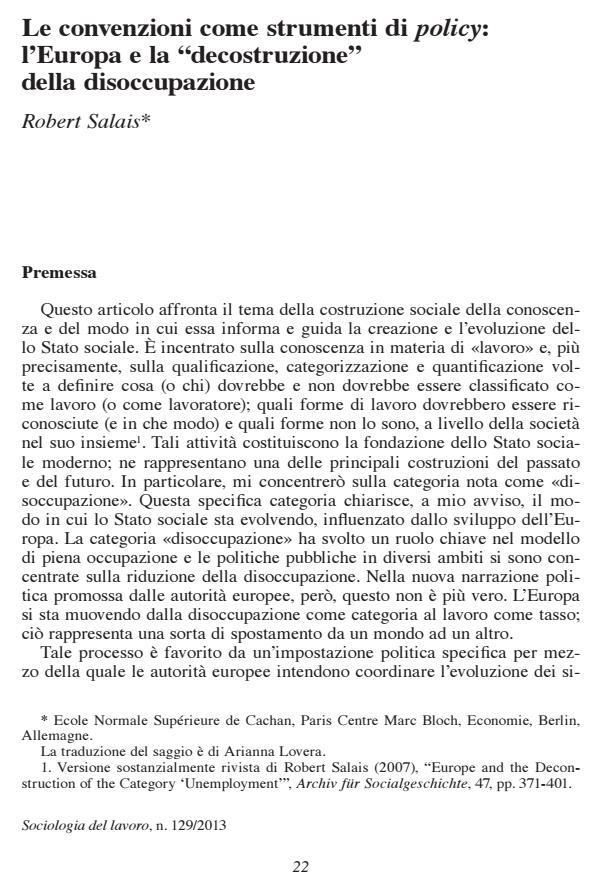Using conventions as political tools: the case of the Europe’s deconstructing of unemployment
Journal title SOCIOLOGIA DEL LAVORO
Author/s Robert Salais
Publishing Year 2013 Issue 2013/129 Language Italian
Pages 18 P. 22-39 File size 263 KB
DOI 10.3280/SL2013-129003
DOI is like a bar code for intellectual property: to have more infomation
click here
Below, you can see the article first page
If you want to buy this article in PDF format, you can do it, following the instructions to buy download credits

FrancoAngeli is member of Publishers International Linking Association, Inc (PILA), a not-for-profit association which run the CrossRef service enabling links to and from online scholarly content.
At the light of theoretical framework of the economics of convention the article deals with the social construction of knowledge and how it informs and guides the creation and evolution of the social state. Specifically, the article concentrates on the category known as "unemployment", because it sheds light on how the social state is evolving as influenced by the development of Europe. In the new political narrative promoted by the European authorities policy makers are moving from unemployment as a category to employment as a rate. This shift of paradigm is a process that transforms cognitive conventions into political tools, and the main consequence is to reduce the knowledgeable to the quantifiable.
Keywords: Common knowledge, unemployment, quantification, cognitive hegemony, Open Method of Coordination
- Aa.Vv. (1989), L’économie des conventions, Revue économique, numero speciale, 40, 2, marzo
- Desrosières A. (1993), La politique des grands nombres, Paris: La Découverte
- Desrosières A., Thévenot L. (1988), Les catégories socio-professionnelles, Paris: La Découverte
- Eymard-Duvernay F., a cura di (2006), L’économie des conventions, quinze ans après, Paris: La Découverte
- Goody, J., (1979), La raison graphique, Paris: Minuit
- Gramsci A. (1975), Quaderni dal carcere, edizione critica dell’Istituto Gramsci a cura di Gerratana V., Torino: Einaudi
- Hopwood A., Miller P., eds. (1994), Accounting as Social Institutional Practices, Cambridge: Cambridge University Press
- Lascoumes P., Le Galès P., eds. (2004), Gouverner par les instruments, Paris: Presses de la Fondation Nationale del Sciences Politiques
- Lewis D. (1969), Convention: Cambridge MA, Harvard University Press
- Mansfield M., Salais R., Whiteside N., eds. (1994), Aux sources du chômage 1880-1914. Une comparaison interdisciplinaire entre la France et la Grande- Bretagne, Paris: Belin
- Orléan A., eds. (1994), L’analyse économique des conventions, Paris: Presses Universitaires de France, 2004
- Phillips G., Whiteside N. (1985), Casual Labour. The Unemployment Question in the Port Transport Industry 1880-1970, Oxford: Oxford University Press
- Power M. (1997), T he A udit S ociety. R ituals o f Verification, Oxford University Press, Oxford
- Power M., eds. (1994), Accounting and Science. Natural Inquiry and Commercial Reason, Cambridge: Cambridge University Press
- Salais R., Baverez N., Reynaud B. (1986), L’invention du chômage, Paris: Presses Universitaires de France, 1999
- Salais R., (1998), Á la recherche des fondements conventionnels des institutions, in Salais R., Chatel E., Rivaud-Danset D., a cura di, Institutions et conventions. La réflexivité de l’action économique, Paris: Editions de l’Ecole des Hautes Etudes en Sciences Sociales, pp. 255-291
- Salais R. (2006a), Reforming the European Social Model and the Politics of Indicators. From the Unemployment Rate to the Employment Rate in the European Employment Strategy, in Jepsen M., Serrano A., eds., Unwrapping the European social model, Bristol: The Policy Press
- Salais R., (2006b), On the Correct (and Incorrect) Use of Indicators in Public Action, Comparative Labor Law & Policy Journal, 27, 2, pp. 237-256
- Thompson C.B. (1926), La réorganisation des usines, suivant les méthodes Taylor- Thompson. Réorganisation administrative, réorganisation à l’atelier, Paris: Langlois
- Whiteside N. (2007), Unemployment Revisited in Comparative Perspective, International Review of Social History, 52, 1, pp. 35-56
- Zimmermann B. (2001), La constitution du chômage en Allemagne. Entre professions et territoires, Paris: Editions de la Maison des Sciences de l’Homme
- Sicurezza, lavoro e giustizia sociale: trasformazioni in corso Vando Borghi, in SOCIOLOGIA DEL LAVORO 130/2013 pp.7
DOI: 10.3280/SL2013-130001 - Potenzialità e criticità di un'esperienza locale di creazione e utilizzo di strumenti di analisi delle traiettorie scolastiche e delle transizioni al lavoro alla luce del capability approach Barbara Giullari, in SOCIOLOGIA DEL LAVORO 141/2016 pp.107
DOI: 10.3280/SL2016-141007 - From Knowledge to Informational Basis: Capability, Capacity to Aspire and Research Vando Borghi, in Critical Sociology /2018 pp.899
DOI: 10.1177/0896920517705437 - Critiquer le capitalisme par la banque : le crédit alternatif en tant qu’instrument politique Arianna Lovera, in Revue Française de Socio-Économie /2019 pp.161
DOI: 10.3917/rfse.023.0161
Robert Salais, Le convenzioni come strumenti di policy: l’Europa e la "decostruzione"della disoccupazione in "SOCIOLOGIA DEL LAVORO " 129/2013, pp 22-39, DOI: 10.3280/SL2013-129003